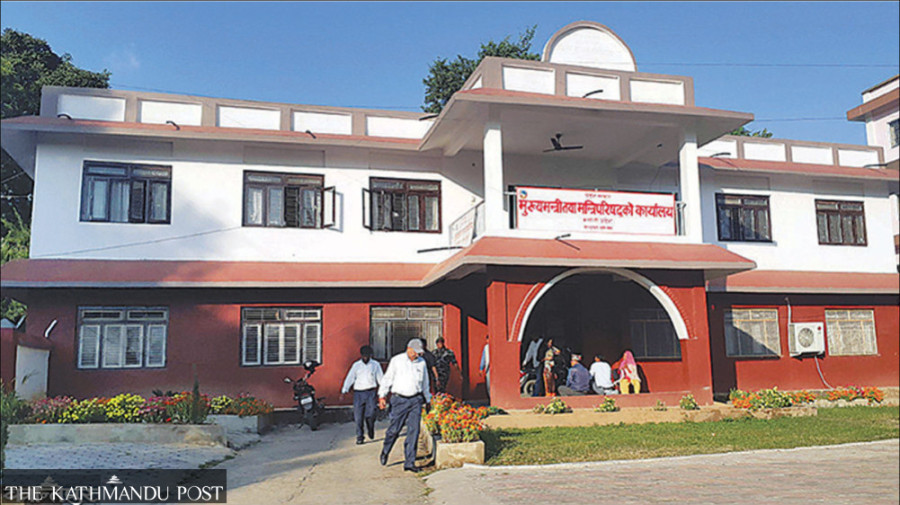Karnali Province
Karnali Province gets no land for an admin building despite years of search
Leaders believe Kathmandu’s refusal to give them land for the purpose shows Centre’s reluctance to devolve power.
Jyotee Katuwal
The Karnali provincial government on December 9, 2019 decided to build an integrated administrative building at Birendranagar-7. The detailed project report (DPR) of the structure included the design of a building where all the provincial ministries would be housed under one roof.
But the project never took off as the federal government refused to allow the provincial authorities to use the land at the proposed site.
Successive chief ministers of the province—Mahendra Bahadur Shahi, Jivan Bahadur Shahi and Raj Kumar Sharma—frequented the Office of the Prime Minister and the federal ministry of urban planning to get the approval, to no avail.
Former chief minister Sharma said the project couldn’t progress as the ministry of urban planning didn’t give the land.
“I personally visited the ministry of urban planning in Kathmandu and the officials there pledged to take the decision but they are yet to do so,” he said. “If they cannot allow the provincial government even to build an administrative building, hoping it would devolve other rights to the provinces would be unrealistic.”
The budgets earmarked by successive provincial governments have remained unused due to the centre’s apathy to address their concerns.
“Both the federal and local governments have the authority on land use but the provinces don’t,” said Chief Minister Yamlal Kandel. “So our province hasn’t been able to make a building. This illustrates the centre’s apathy towards the provinces.”
The provincial authorities have also faced difficulties in coordinating with the chief district officers. Provincial authorities are struggling to maintain law and order, ensure road safety and control crimes in the absence of specific laws related to the mobilisation of police.
“Provincial governments have failed to carry out their duties due to the centralised mindset of leaders in Kathmandu,” former minister for law of the province Naresh Bhandari said. “It is high time people in provinces fought for the rights of the sub-national governments so that the provincial authorities can actually do some valuable work for people’s benefit.”
He said that it is vital that provincial governments have their own police force and administrative officials.
The provinces don’t have their own civil servants either. The secretaries leading provincial ministries are deployed from the federal government. Multiple provincial leaders the Post talked to said that they can’t make the secretaries, who are accountable to the federal government, work earnestly.
Former member of the planning commission of the province, Dipendra Rokaya, said that the commission can’t formulate policies in line with the local needs as even the commission depends on federal agencies.
The constitution has three separate lists of exclusive rights of federal, provincial and local governments along with the lists of concurrent rights. “But those in Kathmandu are reluctant to allow the provinces to use their exclusive rights,” said an official of the commission.
Prachanda Pokharel, a lecturer at the Mid-West University, said that the centre has weakened the federal system by barring the provinces from using their constitutional rights.
“The centralised mindset of the leaders has weakened the provinces. Leaders in Kathmandu haven’t even formulated the laws necessary to implement the federal system,” Pokharel said. “What kind of federal system are we practising whereby the minister for internal affairs and law can’t even mobilise the police and chief district officers of their own province?”
Former chief minister Sharma said people are questioning the relevance of the provinces, citing their failure on delivery. “But how can we perform when our hands are tied?” he said.




 16.98°C Kathmandu
16.98°C Kathmandu














